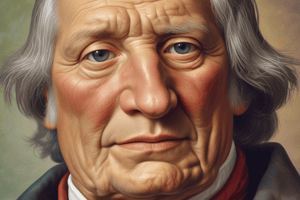Podcast
Questions and Answers
Explain Hegel's concept of 'the dynamic whole' and how it relates to understanding reality.
Explain Hegel's concept of 'the dynamic whole' and how it relates to understanding reality.
Hegel views reality as interconnected, where each part is understood only in the context of the whole. This perspective, known as absolute idealism, suggests that understanding individual entities requires grasping the larger system they are a piece of.
Describe the dialectical method (thesis, antithesis, synthesis) and its role in Hegel's philosophy.
Describe the dialectical method (thesis, antithesis, synthesis) and its role in Hegel's philosophy.
The dialectical method describes how an idea (thesis) generates its opposite (antithesis), leading to a synthesis that integrates both. This process drives the evolution of ideas and historical events, creating progress through conflict and resolution.
How does Hegel view history, and what role does the 'Spirit' (Geist) play in his interpretation of historical events?
How does Hegel view history, and what role does the 'Spirit' (Geist) play in his interpretation of historical events?
Hegel views history as the progressive realization of human freedom. The Spirit (Geist) drives history towards the full expression of human self-consciousness, suggesting that historical events follow a rational process despite apparent randomness.
Explain Hegel's perspective on ethical life and how individual morality relates to society and the state.
Explain Hegel's perspective on ethical life and how individual morality relates to society and the state.
What role do art and religion play in Hegel's philosophy, specifically in relation to the 'absolute spirit'?
What role do art and religion play in Hegel's philosophy, specifically in relation to the 'absolute spirit'?
Describe Hegel's philosophical approach, emphasizing the systematic and historical aspects.
Describe Hegel's philosophical approach, emphasizing the systematic and historical aspects.
How does Hegel use dialectical reasoning in his philosophical methodology?
How does Hegel use dialectical reasoning in his philosophical methodology?
Explain Hegel's view on abstraction and conceptual analysis, and why they are important in his philosophical system.
Explain Hegel's view on abstraction and conceptual analysis, and why they are important in his philosophical system.
Summarize Hegel's influence on subsequent philosophy, particularly on Karl Marx and critical theory.
Summarize Hegel's influence on subsequent philosophy, particularly on Karl Marx and critical theory.
Discuss the ongoing debates and reinterpretations of Hegel's work in contemporary scholarship.
Discuss the ongoing debates and reinterpretations of Hegel's work in contemporary scholarship.
How did the political and social changes during Hegel's early life influence his philosophical perspective?
How did the political and social changes during Hegel's early life influence his philosophical perspective?
In Phenomenology of Spirit, how does Hegel describe the development of consciousness, and what key concept does he introduce to explain this evolution?
In Phenomenology of Spirit, how does Hegel describe the development of consciousness, and what key concept does he introduce to explain this evolution?
What is the primary focus of Hegel's Science of Logic, and why is this work considered foundational to his entire philosophical system?
What is the primary focus of Hegel's Science of Logic, and why is this work considered foundational to his entire philosophical system?
According to Hegel's Philosophy of Right, through which institutions is ethical life realized, and what role does the state play in this realization?
According to Hegel's Philosophy of Right, through which institutions is ethical life realized, and what role does the state play in this realization?
How did Hegel view art and religion in relation to philosophy, and what did he believe each contributed to understanding truth?
How did Hegel view art and religion in relation to philosophy, and what did he believe each contributed to understanding truth?
Explain Hegel's concept of the 'Absolute' and its significance in his philosophical system.
Explain Hegel's concept of the 'Absolute' and its significance in his philosophical system.
Describe Hegel's dialectical method. How does it function, and why is it central to his philosophy?
Describe Hegel's dialectical method. How does it function, and why is it central to his philosophy?
Discuss Hegel's perspective on freedom. How did he believe freedom is achieved within the context of the state and ethical life?
Discuss Hegel's perspective on freedom. How did he believe freedom is achieved within the context of the state and ethical life?
Flashcards
Georg Wilhelm Friedrich Hegel
Georg Wilhelm Friedrich Hegel
German philosopher, key figure in German Idealism, saw reality as a dynamic process.
Hegel's Core Philosophy
Hegel's Core Philosophy
Understanding reality through ongoing change and development.
Dialectical Method
Dialectical Method
A method of philosophical argument involving a back and forth between opposing views.
Phenomenology of Spirit
Phenomenology of Spirit
Signup and view all the flashcards
Science of Logic
Science of Logic
Signup and view all the flashcards
Philosophy of Right
Philosophy of Right
Signup and view all the flashcards
Hegel on Art and Religion
Hegel on Art and Religion
Signup and view all the flashcards
Alienation and Reconciliation
Alienation and Reconciliation
Signup and view all the flashcards
The Dynamic Whole
The Dynamic Whole
Signup and view all the flashcards
Rational Structure of Reality
Rational Structure of Reality
Signup and view all the flashcards
Process and Change
Process and Change
Signup and view all the flashcards
Historical Rationality
Historical Rationality
Signup and view all the flashcards
Role of the Individual and the State
Role of the Individual and the State
Signup and view all the flashcards
Ethical Life
Ethical Life
Signup and view all the flashcards
Art and Religion
Art and Religion
Signup and view all the flashcards
Role of Abstraction and Conceptual Analysis
Role of Abstraction and Conceptual Analysis
Signup and view all the flashcards
Dialectical Reasoning Influence
Dialectical Reasoning Influence
Signup and view all the flashcards
Study Notes
- Georg Wilhelm Friedrich Hegel was a key figure in German idealism.
- Hegel's philosophy aimed to understand reality as a dynamic and evolving process.
- His work has had a significant impact on metaphysics, epistemology, political theory, and aesthetics.
Historical Context and Biography
- Hegel was born in Stuttgart, Germany, in 1770.
- His early education was rooted in the Enlightenment.
- He studied theology and philosophy at the Tübingen Stift, where he encountered ideas that influenced his dialectical method.
- Hegel became a professor at the University of Berlin, an intellectual center in post-Napoleonic Europe.
- Hegel's thought emerged during a time of revolutionary ideas and rising nationalism.
- The French Revolution and its aftermath deeply influenced Hegel's views on history and the development of spirit (Geist).
Major Works and Literary Contributions
- Hegel's most famous work is Phenomenology of Spirit (1807), which traces the development of consciousness.
- It introduces the dialectical method.
- It shows the evolution of self-awareness via alienation and reconciliation.
- Science of Logic (1812–1816) develops a comprehensive system of logic.
- It has had a lasting impact on metaphysical thought.
- Philosophy of Right (1820) applies his philosophical system to political and ethical issues.
- It examines freedom, civil society, and the role of the state.
- Ethical life is realized through family, civil society, and government.
- Hegel wrote extensively on art and religion.
- He considered them as expressions of the absolute spirit.
- Art, religion, and philosophy represent different stages in the unfolding of truth.
- Each provides a unique perspective on reality.
Core Philosophical Ideas
- Hegel viewed reality as an interconnected whole where every part is interdependent, known as absolute idealism.
- Hegel believed that “the real is rational."
- History and nature are governed by an underlying logical structure.
- What seems chaotic is a manifestation of a rational, self-developing system.
The Dialectical Method
- Hegel's method is often summarized as thesis, antithesis, synthesis.
- Contradictions are essential to development.
- Every idea (thesis) gives rise to its opposite (antithesis).
- Their conflict leads to synthesis (a higher level of understanding).
- The dialectical process is dynamic.
- It drives the evolution of ideas, culture, and history.
- It underlies progress and the unfolding of historical events.
History and the Evolution of Spirit (Geist)
- Hegel viewed history as the progressive realization of human freedom and self-consciousness.
- He believed that historical events follow a rational process toward expressing human spirit.
- Individuals find true freedom by participating in the community's ethical life.
- The state expresses the rational and ethical will of its people.
Influence on Ethics, Politics, and Aesthetics
- Hegel's ethics is deeply communal.
- Individual morality is intertwined with societal ethical norms, expressed through family and the state.
- Art and religion are key expressions of the absolute spirit.
- They provide access to abstract truths.
- They serve as a bridge between the finite and the infinite.
Methodology and Philosophical Approach
- Hegel's approach is marked by grand systematization and integration of all branches of knowledge.
- Hegel's method involves analysis of contradictions and their resolution.
- Abstract concepts must be examined within their historical and logical context for philosophy to evolve.
Legacy and Influence
- Hegel's ideas influenced numerous schools of thought.
- His dialectical method influenced Marx's historical materialism.
- German idealism, existentialism, and critical theory have been shaped by his work.
- Hegel's ideas on freedom, the state, and ethical life continue to inform debates in political philosophy.
- Hegel's dense writings have led to diverse interpretations and continued debate.
Concluding Thoughts
- Hegel's philosophy is an attempt to capture the dynamism and interconnectedness of reality.
- His dialectical method, absolute idealism, and vision of history as the unfolding of human freedom provide a framework for understanding change and development.
- Hegel challenges people to see beyond static categories and appreciate the dialectical nature of reality.
Studying That Suits You
Use AI to generate personalized quizzes and flashcards to suit your learning preferences.




